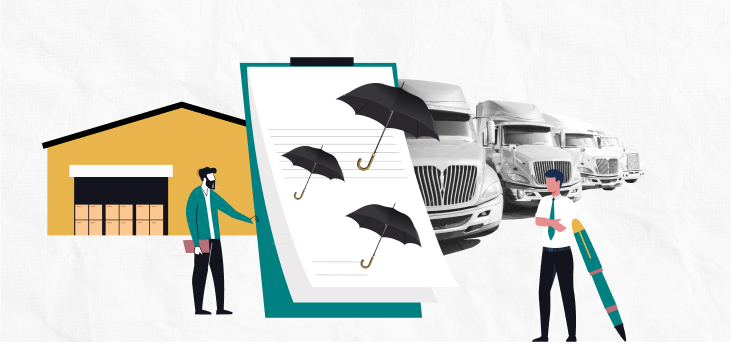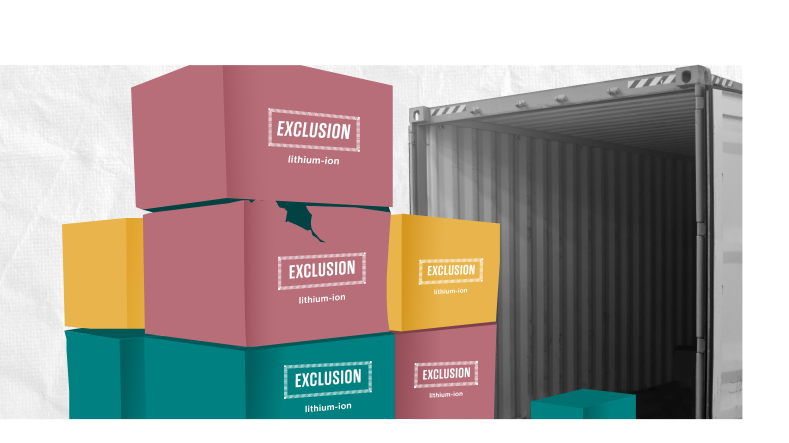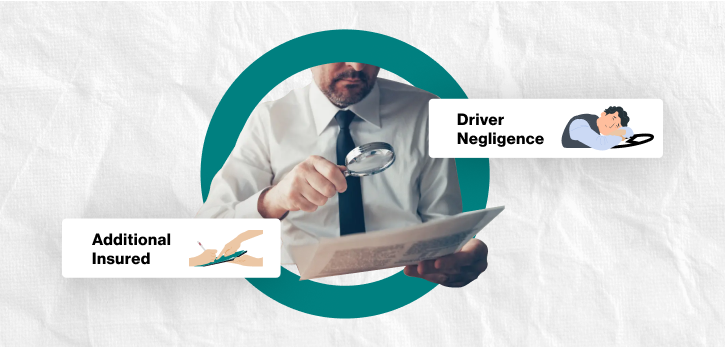
If you haven’t encountered the situation of needing to quickly increase your insurance coverage to support a specific customer requirement within a big contract opportunity, you’re bound to be in this situation at some point during your freight broker career.
There’s a variety of ways to approach risk management as the owner of a freight brokerage company. You may err on the cautious side and have the most comprehensive coverage on the market, or more likely, you tolerate a certain level of risk and carry just the amount of coverage that you need for your current book of business.
However, when a big contract opportunity presents itself that requires more insurance coverage than you currently have, it’s important to know a few specific things.
When freight brokers are in this situation, here’s a few things to know:
1. Know the differences between coverages

When selecting insurance coverage, it’s important to understand the distinctions between different lines of coverage and choose the most relevant one for your needs. Here are a few examples:
- Per-Shipment Insurance: Protects the total value of the cargo.
- Broad Form Coverage: Protects against loss or damages when carriers fail to pay.
- Excess Liability Coverage: Provides protection in the event of litigation due to accidents resulting in injury or loss of life.
Variation in Coverage Situations
Different insurance providers may offer varying coverage for specific situations. It’s essential to compare policies carefully and ask your insurance provider to clearly outline what’s included in each option. Avoid assuming that all providers offer the same coverage. Here are a couple of scenarios:
- Cargo Damage During Loading: While one insurance provider may cover this, others might not. Comparing policies is crucial.
- Mode of Transportation and Type of Commodity: Broad Form Contingent Cargo Insurance might not apply to all cargo commodities, such as high-risk cargo such as alcohol, tobacco, electronics, copper, and non-ferrous metal. Make sure your insurance provider verifies coverage for your specific commodity and transportation mode.
2. Know the Policy Exclusions

Exclusions are an unavoidable part of insurance policies and define what will not be covered. Understanding these exclusions is a must. Here are a few points:
- Commodity-Specific Exclusions: Policies may exclude coverage for certain commodities. For instance, if a policy covers only ferrous metals, cargo without iron, aluminum, or copper won’t be covered. Similarly, policies excluding garments won’t cover clothing.
- Situation-Specific Exclusions: Exclusions can also be situation-specific. For example, theft-related exclusions may include:
- Theft by the truck driver or any other employee.
- Theft from an unattended vehicle, unless certain conditions are met. Some policies cover unattended vehicles if they are securely locked and located in a safe place.
- Loss when the trailer is not attached to the power unit.
3. Know How the Contract Changes Your Responsibility

Freight brokers often face increased liability demands from shippers due to current litigation trends. It’s vital for brokers to carefully review shipper contracts for any provisions that increase your liability and jeopardize your business model, and your ability to defend as a Broker. Here are a few examples:
- Unrealistic Liability Expectations: Some contract terms might hold the freight broker liable for situations beyond their control, such as driver negligence. Brokers should be aware of these unrealistic expectations and address them appropriately.
- Demands to Name Shippers as Additional Insured: Shippers may request that the freight broker names the Carrier as Additional Insured. However, this can potentially void the broker’s existing insurance policy. Educating shippers on the implications of such demands is important.
Navigating Contract Hurdles
To address these challenges, freight brokers should ideally engage the shipper’s corporate counsel, President, CEO, or CFO to navigate beyond contract hurdles. Thoroughly reading and flagging areas of potential discrepancy in responsibility and roles defined within the shipper contract is essential.
4. Know Where To Find Coverage For The Gaps

Contrary to industry standards, it IS possible to increase insurance coverage quickly to meet the requirements of big shipper contracts. Working closely with your insurance agent is key to obtaining the necessary coverage increases promptly.
Communicate with Your Insurance Agent
If you’re not receiving the necessary quotes within the given time frame, it’s important to inform your insurance agent. They can find alternative options that will help you meet your deadlines and fulfill all coverage requirements.
When you sign big contracts as a freight broker, it’s your responsibility to understand how a contract may create uninsurable obligations not covered by your insurance Policies . You need to be vigilant in identifying unrealistic liability expectations and navigating contract terms that could impact your existing coverage. By working closely with your insurance agent and communicating your needs, you can secure the necessary coverage and avoid potential gaps in protection.
LogistIQ Can Help
Unlike other insurance providers, our team at LogistIQ prides ourselves on giving our customers quick support when they need it most. Our streamlined process and commitment to quick quotes helps smooth the stress that oftentimes accompanies the bidding process on big shipper contracts. We work hard to make sure our freight broker customers can capitalize on the big contract opportunities when they arise.
We provide three key kinds of coverage for freight brokers in this situation:
- Freight Insurance Fast (FIF) provides per-shipment insurance for Less-than-Truckload or Truckload shipments that protects the value of the cargo in the event of damage or loss.
- Broad Form Contingent Cargo Insurance protects all of your freight* against cargo loss or damages that aren’t covered or paid by the carrier.
- *This type of coverage can be arranged to be shipper-specific or applicable to the entire freight broker’s book of business.
- Freight Broker Excess Liability Coverage provides extra coverage and protection in the event of an accident where someone is injured or killed. This type of coverage is solely to cover the freight broker in the event of litigation.
If you’re growing tired of losing big opportunities due to slow insurance partners, ask your insurance agent/broker to contact us for a quote on your insurance needs.
How To Move Forward
For Freight Brokers
We will connect you with a qualified agent that best meets your needs.

 1-888-910-4747
1-888-910-4747